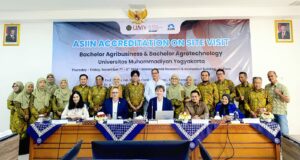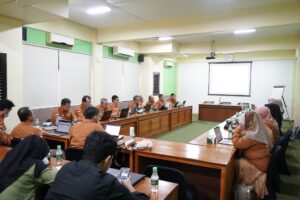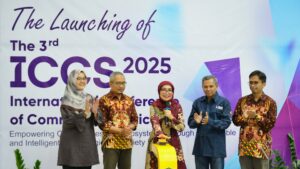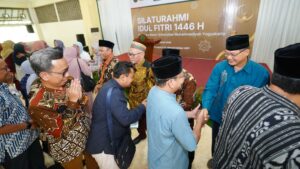Being grateful is a practice. It is not enough to be grateful with words or in the heart, one must also translate it into action. In Islam, being grateful is also a form of devotion to Allah. As such, as his followers, we must be grateful for everything Allah has given to us. This is the background of Nur Kholik Afandi’s dissertation in the Islamic Psychology Doctorate Promotion Session of Universitas Muhammadiyah Yogyakarta (UMY) in the Postgraduate Building Courtroom, UMY Central Campus on Saturday (03/08).
In his dissertation, Afandi discussed the “Concept of Gratefulness in the Al Misbah Tafsir and its Relevance to Islamic Education.” The concept of gratefulness in the Al Misbah Tafsir contains spiritual and psychological aspects of amanah (commitment), qanaah (acceptance), tawadhu (humility), tawakal (patience), istiqamah (consistency), optimism, creativity, hard work, and social actions. This concept is in line with the theory of gratefulness in positive psychology. Both disciplines serve to strengthen and complete. The spiritual values of gratefulness in Al Misbah Tafsir is a spiritual asset to create spiritual safety. Meanwhile, the values of gratefulness in positive psychology is an empirical fact to explain the concept of gratefulness in Al Misbah Tafsir which is doctrinal in nature. Both the psychological and spiritual values in Al Misbah Tafsir is relevant in the development of a grateful self. This aspect is one of the goals of Islamic education.
“The gratefulness for all that Allah has given for a farmer does not stop at the recitation of “Alhamdullillah” for a good harvest, but in a wider form, such as how the harvest can be useful for many people. The true form of gratefulness is your responsibility to Allah,” the receiver of the ministry of religious affairs’ scholarship stated.
“In surah Ibrahim Verse 7 of the Qur’an, it is stated that someone who is grateful will receive more from Allah; “And when your Lord proclaimed: If ye give thanks, I will give you more; but if ye are thankless, lo! My punishment is dire,” he added.
Dr. Afandi hopes that his research can continue to be developed and change how people think of gratefulness to Allah SWT. Dr. Afandi graduated UMY Postgraduate with a 3 year 11 month study time. He graduated as the 73rd doctor of UMY’s Islamic Education Psychology Doctorate Program. The tester and promotor team of this session consist of Sri Atmaja P. Rosyidi, S.T., Msc.Eng., Ph.D., PE. as the chairman of the meeting, Prof. Drs. Subandi, M.A., Ph.D. as a promotor, Dr. Hanim Ilyas, M.A. as co-promotor, Dr. Aris Fauzan, M.A., Prof. Dr. Muhammad Chirzin, M.Ag., Dr. Muhammad Anis, M.A., Dr. Akit Khilmiyah, M.Ag., Dr. Abd. Madjid, M.Ag. as testers.







